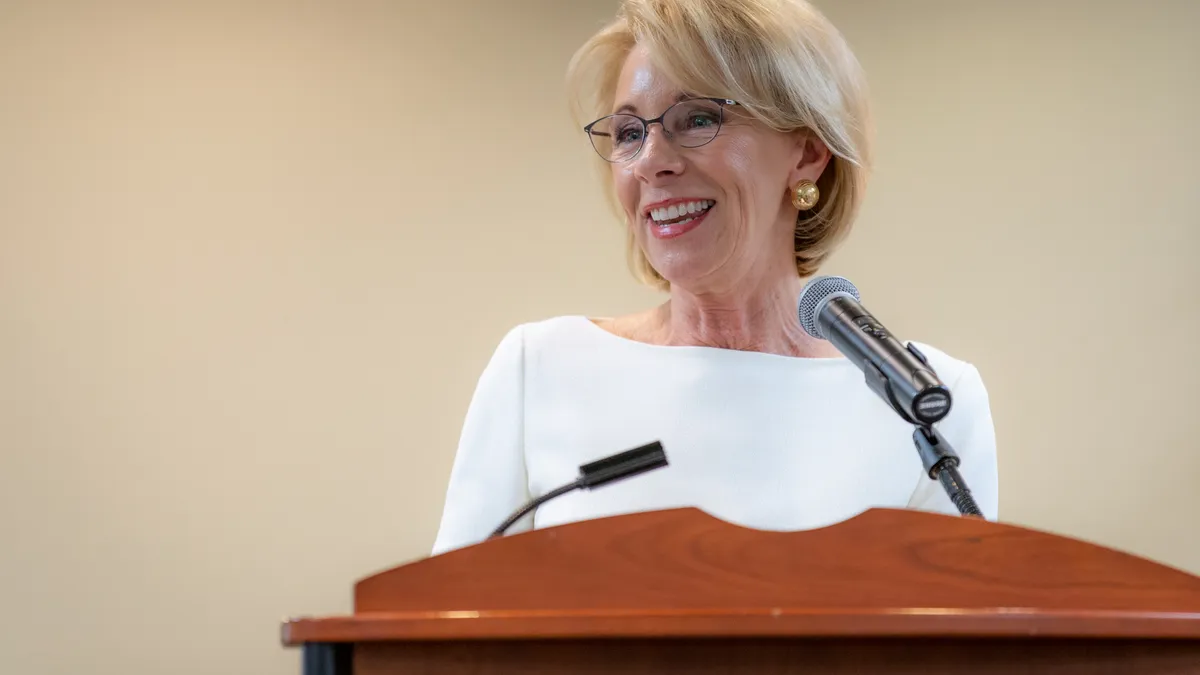Dive Brief:
- The U.S. Department of Education on Thursday published its final rules for accreditation and state authorization for distance education, which it says will foster innovation and reduce the regulatory burden on colleges and accreditors.
- Critics of the rules, however, say they will reduce oversight on colleges and universities and potentially harm students.
- Most of the final regulations are identical to proposals released earlier this year, although the department changed language that observers say will lead to reduced state oversight of online institutions. The rules are expected to go into effect on July 1, 2020.
Dive Insight:
The regulations are a result of a negotiated rulemaking session held earlier this year. Its participants — which included representatives for colleges, students and accreditors — reached consensus on language for new rules on a wide range of issues, including accreditation standards and distance education.
The rules finalize several large changes the Education Department previously proposed. Those include:
- Eliminating geographical boundaries for accreditors.
- Making it easier for colleges to get program approvals or make institutional changes.
- Loosening accreditor compliance standards.
- Easing the path for some new accreditors to become recognized.
- Giving accreditors more leeway over sanctions.
- Requiring financially shaky colleges to submit teach-out plans sooner.
The Ed Department has touted the rules as a method of giving colleges more room to experiment.
"We rejected the idea that one-size-fits-all solutions make sense in a world where education needs continue to evolve," Education Secretary Betsy DeVos said in a statement. "[W]e ended the stranglehold that a system designed when people traveled by horse and buggy continued to have on institutions."
Some policy experts say the rules will weaken the accreditation system. Although the department acknowledged those critics — some of whom advocated for a complete rewrite of the rules — it did not change language in the final regulations based on those concerns.
"Colleges will be able to shape-shift without oversight," Clare McCann, deputy director for federal higher education policy at New America, a left-leaning think-tank, said in an interview with Education Dive. "That's one of the most concerning things we see from poor-performing schools, is that they fundamentally change their mission or expand their footprint in a way that they're not well-prepared to serve students."
Department representatives acknowledged the rules could allow accreditors to lower their standards. They called on the National Advisory Committee on Institutional Quality and Integrity (NACIQI), which advises the agency on accreditation matters, to monitor accreditors.
However, NACIQI members have warned the department's regulations could limit the information it receives on accreditors. The regulations would also reverse progress accreditors have made in monitoring and sanctioning the institutions in their purview, one representative of NACIQI said.
The department has also caught flak for changing language agreed upon in the negotiated rule making session concerning state authorization agreements. These agreements require online institutions to be authorized in every state in which they enroll students.
Under the revisions, institutions will be allowed to operate in another state just by participating in the State Authorization Reciprocity Agreement. Or in other words, the reciprocity agreement preempts state laws, policy experts told Education Dive.
"Rather than implementing what the negotiating committee had come to consensus on, the Department backtracked entirely," Michael Itzkowitz, a senior fellow at left-leaning think tank Third Way, wrote to Education Dive in an email. "The change in regulations will allow institutions with fully online programs ... to evade state laws even where they're enrolling and harming students."
Other groups have also been swift to criticize the rules. The Institute for College Access & Success wrote that the new rule "undermines states and accreditors' oversight of higher education by design" in a statement posted on its website.















